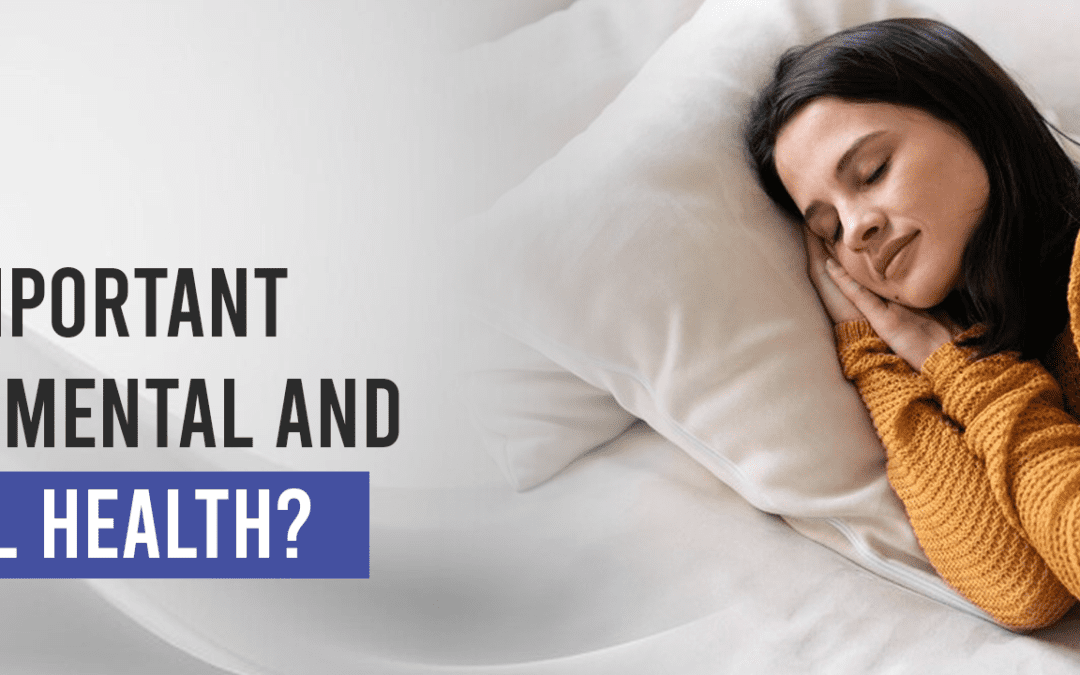Sleep is one of the most fundamental—yet often overlooked—pillars of good health. While we might cut back on sleep to meet deadlines or binge-watch shows, the consequences of sleep deprivation ripple across our minds and bodies. In today’s fast-paced world, understanding the psychology of sleep and its profound effects on mental and physical health can help you prioritize rest, enhance well-being, and lead a more balanced life.
In this blog, we explore the science and psychology of sleep, explaining why it is crucial for mental clarity and physical vitality. From its role in cognitive function to how it strengthens immunity, this post takes a holistic approach to explain why investing in quality rest is an investment in yourself.
Why Is Sleep So Important?
At first glance, sleep may seem like a simple downtime for the brain and body. However, it’s anything but passive. During sleep, your brain remains active, performing essential housekeeping tasks that support everything from memory consolidation to emotional regulation. Meanwhile, your body undergoes vital repair processes, highlighting the need for sufficient, high-quality sleep to maintain overall health.
In today’s world, sleep is often sacrificed due to busyness, stress, or the lure of technology. However, it’s important to understand that sleep is not just an optional add-on; it’s a critical component of human health and well-being.
The Connection Between Sleep and Mental Health
- Sleep and Emotional Regulation
Have you ever noticed how a poor night’s sleep leaves you irritable, anxious, or overly sensitive the next day? That’s because sleep plays a significant role in emotional regulation. During REM (rapid eye movement) sleep, your brain processes emotions, sorts through memories, and helps regulate your mood. Without enough REM sleep, maintaining emotional balance becomes difficult, leading to mood swings, irritability, and anxiety.
A study published in The Journal of Neuroscience found that sleep deprivation heightens the brain’s emotional centers, particularly the amygdala, which is responsible for fear and aggression. Lack of sleep can make you more reactive to stress, intensifying negative emotions.
- Cognitive Function and Memory
Sleep is crucial for brain plasticity, the brain’s ability to adapt, learn, and form new memories. During deep, slow-wave sleep, the brain consolidates and organizes the day’s events, making it easier to recall information later. This is why students are often encouraged to get a good night’s rest before exams—sleep enhances memory retention and problem-solving skills.
Chronic sleep deprivation, on the other hand, has been linked to cognitive decline, impaired decision-making, and slower reaction times. If you find yourself struggling to remember where you left your keys or why you walked into a room, poor sleep could be a major factor.
- Sleep Disorders and Mental Health Conditions
Sleep problems aren’t just symptoms of mental health disorders; they can also be contributing causes. Insomnia, for example, is both a cause and a consequence of depression and anxiety. People with insomnia are ten times more likely to develop depression than those who sleep well. Similarly, those with anxiety disorders have a higher risk of developing sleep disturbances.
Addressing sleep issues can lead to significant improvements in mental health. Cognitive-behavioral therapy for insomnia (CBT-I), for instance, is effective in treating both sleep disorders and comorbid conditions like depression.
The Physical Health Benefits of Sleep
- Sleep and Immune Function
A strong immune system is one of the best defenses against illness, and sleep is critical in keeping it robust. During sleep, your immune system releases proteins called cytokines, some of which promote sleep and help combat infections, inflammation, and stress. When you don’t get enough sleep, the production of these protective cytokines decreases, leaving you more susceptible to illness.
Research published in the journal Sleep found that people who get fewer than six hours of sleep per night are more likely to catch a cold than those who sleep seven hours or more. In other words, quality sleep is one of your best preventive health measures.
- Sleep and Heart Health
Your heart works tirelessly, and sleep gives it a chance to slow down and recuperate. Studies show that people who don’t get enough sleep are at higher risk for cardiovascular diseases, including high blood pressure, heart attacks, and strokes. During deep sleep, your heart rate and blood pressure naturally decrease, which reduces stress on your cardiovascular system.
Additionally, sleep deprivation can cause inflammation in blood vessels, further increasing the risk of heart-related issues. The American Heart Association even highlights sleep deprivation as a significant risk factor for hypertension and other heart diseases.
- Weight Management and Metabolism
If you’re trying to lose weight or maintain a healthy weight, sleep should be a priority. Lack of sleep disrupts the balance of two critical hormones: ghrelin and leptin. Ghrelin stimulates hunger, while leptin signals fullness. Insufficient sleep increases ghrelin and decreases leptin, making you feel hungrier and less satisfied after meals.
Sleep deprivation can also affect your body’s ability to metabolize sugar, increasing the risk of developing insulin resistance and type 2 diabetes. A study in The Lancet Diabetes & Endocrinology found that even partial sleep restriction can reduce insulin sensitivity, emphasizing sleep’s importance in metabolic health.
- Musculoskeletal Health and Recovery
Sleep is crucial for physical recovery, especially for those with active lifestyles or regular exercise routines. During deep sleep, the body repairs tissues, muscles, and bones, and produces growth hormones that aid in recovery. This is especially important for athletes or anyone involved in physical activity, as sleep supports muscle growth, improves endurance, and reduces injury risks.
Without adequate rest, your body struggles to recover, leading to prolonged soreness, decreased strength, and a higher likelihood of injury. In this sense, sleep is the ultimate natural recovery tool.
The Science of Sleep: Understanding the Sleep Cycle
To understand how sleep impacts mental and physical health, it’s essential to grasp the different stages of the sleep cycle. Each stage serves a unique purpose and contributes to overall well-being.
Stage 1: NREM (Non-Rapid Eye Movement) Light Sleep
This is the transition from wakefulness to sleep. Your body begins to relax, and brain waves slow. It’s a light stage of sleep where you can be easily awakened.
Stage 2: NREM Light Sleep
In this stage, your heart rate slows, and body temperature drops, preparing you for deep sleep. Most of your sleep is spent in this stage, which is vital for maintaining a healthy sleep structure.
Stage 3: NREM Deep Sleep (Slow-Wave Sleep)
This is the most restorative stage, where the brain produces slow delta waves. During deep sleep, your body repairs tissues, builds muscle, strengthens the immune system, and consolidates memories. It’s the stage that leaves you feeling refreshed upon waking.
Stage 4: REM (Rapid Eye Movement) Sleep
REM sleep is when most dreaming occurs. Your brain activity resembles wakefulness, and your body experiences temporary paralysis to prevent you from acting out dreams. REM sleep is essential for emotional regulation, learning, and memory processing.
Each sleep cycle lasts about 90 minutes, and you typically go through 4-6 cycles per night. Disruptions to this cycle—whether from sleep disorders or external factors like noise—can prevent you from reaching the most restorative stages of sleep.
How Much Sleep Do You Need?
The amount of sleep required varies by age, but most adults should aim for 7-9 hours of quality sleep per night. Children and teenagers need more, while older adults may require slightly less, though they still benefit from a full night’s rest.
Factors That Influence Sleep Needs
- Genetics: Some individuals naturally need more or less sleep than others.
- Lifestyle: Stress levels, physical activity, and even diet can impact your sleep needs.
- Health Conditions: Chronic illnesses or mental health conditions may increase the need for recovery sleep.
Pay attention to your body’s signals. If you wake up tired, struggle to stay alert during the day, or experience mood swings, it might be time to reassess your sleep routine.
Tips for Improving Sleep Hygiene
Now that we’ve established the importance of sleep, here are some science-backed tips to improve sleep quality:
- Stick to a Sleep Schedule
Go to bed and wake up at the same time each day to regulate your internal clock, making it easier to fall asleep and wake up naturally. Try to maintain this routine, even on weekends, to reinforce your circadian rhythm.
- Create a Restful Environment
Your sleep environment significantly affects the quality of your rest. Ensure your room is dark, quiet, and cool. Consider using blackout curtains, earplugs, or white noise machines. Invest in a comfortable mattress and pillows to support proper alignment.
- Limit Caffeine and Heavy Meals Before Bed
Avoid consuming caffeine in the afternoon and evening, as it can linger in your system for up to six hours. Similarly, steer clear of large, heavy meals right before bed to prevent indigestion that may interfere with sleep.
- Wind Down With Relaxing Activities
Engage in calming pre-bedtime activities like reading, meditating, or practicing deep breathing exercises. Avoid screens (phones, TVs, etc.) at least 30 minutes before bed, as blue light can disrupt melatonin production.
- Stay Active During the Day
Regular physical activity can promote better sleep by reducing stress and increasing the amount of time spent in deep sleep. However, be mindful not to exercise too close to bedtime, as this can have the opposite effect.
Prioritizing Sleep for a Healthier Life
Sleep is more than just rest—it’s a crucial process that restores your body, mind, and soul. From improving emotional resilience to enhancing physical recovery, sleep is the cornerstone of optimal health. By understanding the importance of sleep and adopting healthy sleep habits, you can safeguard your mental and physical well-being for years to come.
At Insights Psychology, we believe in the power of holistic wellness, and sleep is one of the most accessible yet impactful tools in your health toolkit. Prioritize it, nurture it, and watch your mental and physical health thrive.
Sleep is step one—stress management is next! Check out our stress management tips!

